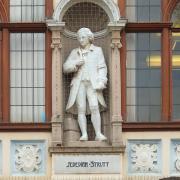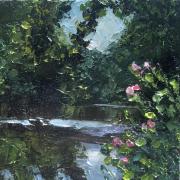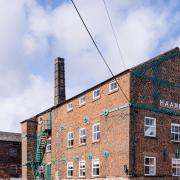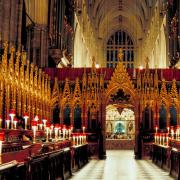Duncan Ward may only be 25 years old but he’s already made quite a mark on the classical music world and has now been handed the task of giving Derby-based orchestra Sinfonia Viva a bright future

Duncan has had a meteoric rise since being name the 2005 BBC Young Composer of the Year when he was just 15 so, despite his tender years, he has already gained the skills and experience needed to undertake the role of Viva’s new principal conductor.
The orchestra has taken its time to find a replacement for Andre de Ridder, who held the post for five years, but has now appointed one of the brightest young talents in the scene.
Duncan says: ‘It’s an exciting new chapter for me and the orchestra. I’m looking forward to seeing the collaboration grow and exploring new ground.’
Sinfonia Viva chief executive Peter Helps is delighted to welcome Duncan aboard.

He says: ‘Duncan’s breadth of skills as both a conductor and composer have already made a huge impact on the orchestral world and he is the perfect fit for Sinfonia Viva.’
That ‘perfect fit’ is also down to the strength of his education work, an important aspect of Viva’s remit.
Duncan is indeed passionate about working with young people and local communities. Following a month working in India in 2006, he subsequently co-founded the WAM Foundation, which sends young UK musicians each year to teach Western classical music in schools across Delhi, Mumbai, Kolkata and Kerala. The charity attracted the attention of the late Ravi Shankar, who invited Duncan to study with him in California in 2010.
Duncan says: ‘Viva was interested in different parts of my musical life. A whole spectrum of stuff that matches the variety of work the orchestra does. I certainly want to work with as many young people in the area as possible and in meaningful, lasting ways. I want to give them unforgettable experiences in music and the arts.
‘So this looks like a good partnership in terms of skills and interest.’
Duncan, perhaps surprisingly, doesn’t come from a musical background.
‘I’m from a large family,’ he says. ‘I’m one of five children but it was only when one of my sisters had an electronic keyboard as a Christmas present that I became interested. I started giving it more attention than anyone else, picking out tunes, playing around. My parents asked if I might want lessons and it took off very quickly from there.’
Even at the age of seven, Duncan clearly had a gift for music. He quite quickly took over playing music for the hymns in school assemblies.
‘I went to a grammar school in Kent and had a quite fantastic head of music who was a trombonist and he was very encouraging. He started me playing the French horn and I started composing more. I went home that summer and composed a full length musical based on Alice in Wonderland. When I presented the score back to him he said, “If you want to put this on you have the school’s backing.” I went around auditioning the staff as the soloists, got an orchestra together and a choir and we put it on and I conducted.’
Duncan was just 13 at the time, an age when not many young people are conducting a premiere of their own full length composition.
He says: ‘I loved doing that, people loved hearing it, so I guess that was the moment when I knew that this would be my life. From then on I wrote a lot more music, conducted more often.
‘Because I didn’t come from a musical family, or a traditional classical background, I was more jazz orientated back then. I was into Scott Joplin and early jazz and I started playing with a New Orleans band who came for a concert at school and I ended up touring with them to some festivals. But from then on I got more drawn into the classical scene and playing and writing for orchestras.’
Duncan was clearly born with his talent but he says he still needed that educational support to make sure he broke through.
He says: ‘You definitely need someone to appreciate that talent and encourage it. I do believe that kids discover things for themselves if they are given the right encouragement on route. I had some excellent teachers – I started going to a specialist music school in London on Saturdays – and it’s important to have those opportunities.’
Duncan was named BBC Young Composer of the Year at the age of 15.
He says: ‘It was an important calling card, statement and recognition. And the prize itself, having a piece played as part of the Proms festival, was really special.’
Since then, Duncan has made successful debuts with the Bamberg and Lucerne Symphony orchestras, Northern Sinfonia, Royal Scottish National, Southbank Sinfonia, Ulster Orchestra and BBC National Orchestra of Wales as well as conducting the Chinese premiere of Peter Grimes in Beijing with a stellar international cast.
Recent composing highlights include a work for the LSO and We’re Going on a Bear Hunt performed by members of the National Youth Orchestra at the Southbank’s Imagine Festival in 2014.
Being based in Berlin and working with the Philharmoniker Orchester-Akademie has further developed his career. He was appointed conducting scholar on the recommendation of Sir Simon Rattle in 2012.
Duncan says: ‘Berlin is the Mecca for any classical music. It’s unbelievably exciting and I’m very privileged to have gone there so young and been taken into the heart of it. It’s music making on an unbelievably high level. Berlin is the capital of the arts and opens your eyes to classical culture in a different way. Even down to funding of the arts, Germany is in a very strong position.’
Having the endorsement of Simon Rattle was a wonderful calling card for Duncan’s Berlin adventure.
He says: ‘He’s a wonderful friend and supporter, very open in me going to him for advice and, when we are working on a project, totally open to my thoughts on a piece. It’s a really good relationship. I’m very lucky.”
Duncan first crossed paths with Viva at a concert in Chelmsford in 2012 and last year he worked with them on an education project, so his appointment as principal conductor wasn’t out of the blue.
‘We knew a bit about each other,’ says Duncan. ‘They were also keen to appoint a composer and conductor, which was in my favour.’
Duncan announced his arrival in Derby with a new commission for Viva entitled Resounding Vaults which was inspired by the decision to move the orchestra’s Derby performance home to the cathedral following the closure of the nearby, fire-damaged Assembly Rooms.
The work was aired at Duncan’s debut concert as principal conductor in January.
He said: ‘Derby Cathedral is a majestic, resonant space. Ever since playing Gabrieli as a young horn player, I have been enchanted by the musical possibilities such a setting can create. In Gabrieli’s case, brass choirs calling to each other from the opposing balconies of St Mark’s, Venice.
‘I therefore leapt at the chance to compose a work showcasing the wind, brass and percussion sections of the orchestra.’
Duncan’s next concert with Viva in the cathedral will be in March and he will be looking then at education plans for 2015. He hopes to help Viva explore new musical directions and expand its already excellent reputation.
He says: ‘You have to make a difference with music, especially on the education side. I’m very keen on promoting better music tuition and giving opportunities to underprivileged kids.’
He’s also hoping that by joining forces with Viva he can further his ambitions, while helping the orchestra with its aims. He says: ‘Every year I end up doing things I wouldn’t have dreamt of the year before, working with great orchestras and in different countries. Some of those I’m desperate to do more with. There are also orchestras I haven’t yet worked with. I would also love to compose a full length opera and perform that at a major house like Convent Garden or the Met... we will just have to see.’
Calling the Cathedral Home
Sinfonia Viva is making Derby Cathedral its home base for concerts after losing the fire-damaged Assembly Rooms a year ago. Derby Cathedral and Sinfonia Viva recently successfully secured £23,500 investment from Arts Council England’s National Lottery-funded Grants for the Arts programme to enable two concerts to be performed at the cathedral including the next date on 18th March. The hope is to build the cathedral’s credentials and capabilities of staging future concerts.
Peter Helps says: ‘Sinfonia Viva is based in Derby and has been performing in the city for more than 30 years. This funding, along with a host of other support, including from colleagues at Derby LIVE, ensures that classical music concerts will continue for Derby audiences.’
Viva leader Benedict Holland adds: ‘Derby Cathedral was the perfect setting for Duncan’s first concert as principal conductor. It was a brilliant introduction to our inspirational and multi-talented newest member.
‘As an orchestra, we pride ourselves on being able to embrace new opportunities and ways of working to make classical music accessible. I am sure that Duncan will quickly become part of the Viva family and bring his own vibrancy to our music making.’
The Next Derby Concert
Sinfonia Viva can be seen at Derby Cathedral on 18th March, 7.30pm, with principal conductor Duncan Ward being joined by soloist Samuel Jacobs (horn). The programme features:
Mendelssohn: Fair Melusine Overture
Pärt: Cantus in Memoriam Benjamin Britten
Mozart: Horn Concerto No.4
Beethoven: Symphony No.7
Tickets are priced £20 (concessions £18). Call 01332 255800 or go to www.derbylive.co.uk



























